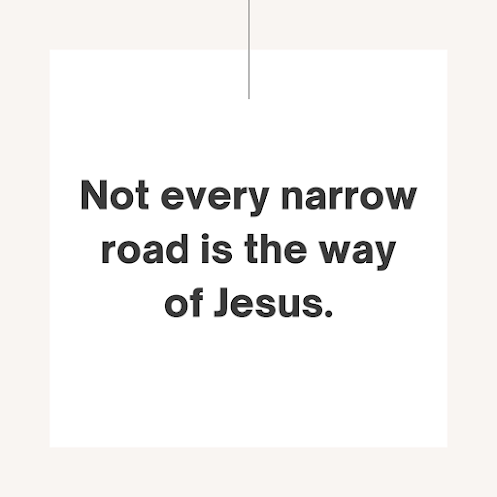Not Every Narrow Road is the Way of Jesus
I've noticed an interesting trend developing over the last 12-18 months. In Matthew 7, Jesus invites us to a "narrow way" in pursuit of the Kingdom of God. Spending time in the Gospels reminds us of how countercultural this way truly is. The picture Jesus paints of this Kingdom that rejects oppression and coercion while uplifting the meek and downtrodden. This Kingdom seeks reconciliation and forgiveness when circumstances might push us towards revenge. The way of Jesus is genuinely narrow because it flies in the face of what has become human nature.
The way of Jesus is narrow, but not every narrow way is the way of Jesus. Just because a concept is countercultural doesn't make it right or good or holy.
A growing movement appears to have gained a foothold within the Church that assumes that all countercultural movements are Jesus' movements. This assumption is a massive misstep that not only adds division within the church but taints our public witness to the world. Two specific examples spring to mind that I want to unpack.
The first misstep is pandemic-related. A video has been circulating of a person claiming that because they have freedom in Christ, how dare she limit that freedom with a mask? Many have co-opted this approach in discussions regarding vaccinations and even COVID treatment. Whether it is questioning the authenticity of the pandemic (a deadly gambit), social distancing and preventative measures (don't mask me!), or therapeutics (hydroxychloroquine and Ivermectin spring to mind), there is a growing trend of rejecting the prevailing science specifically because it's popular or commonly-held. The defense often stems from several sources, ranging from a distrust of authority to political ideology. Where it becomes dangerous is when we inject our faith into our objection. Folks who have never objected to vaccinations in the past are now ardently anti-vax. People who have never questioned medical doctors and scientists' expertise and recommendations are now "doing [their] own research." And tragically of all, they're claiming that because it is countercultural, because it rejects the "world's wisdom," it must be the way of Jesus.
The second tragic turn regards social justice. Since George Floyd's death became a cultural flashpoint, our nation has had significant and necessary discussions on institutional racism, structures that further inequality, and the role that an increasingly militarized police play. These conversations have often been difficult, even for those of us sensitive to them. A concerning trend among many evangelical Christians, however, have sought to undermind these topics. On the one hand, because it has become culturally in vogue to rethink our short and long-term history critically, many Christians have become staunchly resistant to "rewriting our history*." On the other hands, many evangelicals have questioned our very role in seeking justice because it serves as a "distraction from the Gospel." As society shifts, we assume that the way of Jesus must be in resistance. Therefore, we must reject any discussion of social or institutional justice.
The danger is that in making these assumptions, we relegate the Good News of Jesus to such a narrow degree that we rob it of its power. The Gospel was never meant to serve as a means of needless division, nor was it a tool for political purposes. The Gospel, according to Jesus, is designed to establish the Kingdom of God here on earth as it is in Heaven (see Matthew 6:10). As Jesus states in Luke 4, the Kingdom elevates the poor, sets captives free, relieves the oppressed, and gives sight to the blind. It subverts the violent, coercive systems of the world, not for our own sake but the sake of the "least" among us.
Resist the urge to baptize every narrow was as the way of Jesus. When you find yourself bristling against the culture, ask the question: "Whose side was Jesus on?" It was rarely those in power, in authority, or in privilege. Instead, Jesus made the religiously inclined profoundly uncomfortable by removing their pedestal and raising up the "worst of humanity."
Let the narrow way of Jesus be the way that we choose, the way that lavishly loves, selflessly sacrifices for the good of others, that lays down our rights, and rejects coercion and violence. Let the narrow path we choose reject needless conspiracies, anti-science rhetoric, and defiant individualism.
Let us see our lives, our communities, our nation, and our world through the eyes of Jesus instead of seeing Jesus through the eyes of our political and social idealogy.
* Though one could argue that our shared understanding of our history is demonstrably incomplete at best and whitewashed at worst.


Comments
Post a Comment